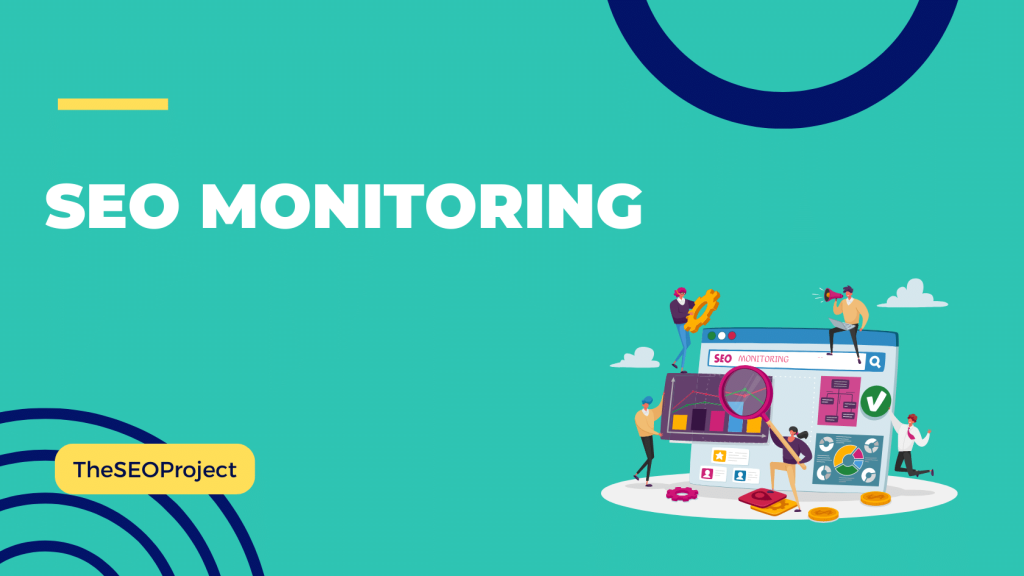To have a total insight into your website and its performance, SEO Monitoring is very essential.
Setting up an SEO campaign for your website can bring you increased visibility and higher search engine rankings. But it doesn’t end there. You need to regularly monitor your SEO to check its performance.
You know that Google constantly keeps changing its algorithm for a better user experience. Hence keeping up with these algorithms gives higher ranks on the search results page. If your page ranked on the first page earlier, it will not remain in that position if you don’t keep an eye on your SEO metrics.
In this article, I will share an in-depth guide on SEO monitoring and why it is an essential practice for your business. I will also provide which key metrics play a crucial role in your SEO monitoring and what tools can help you mitigate the process.
Let me begin with what I have understood about SEO Monitoring.
What is SEO Monitoring?
SEO monitoring refers to the process of tracking and analyzing various metrics and data points related to your website’s search engine performance. It involves regularly monitoring key indicators to evaluate the impact of your SEO strategies and make informed decisions to improve your website’s visibility and rankings.
Conducting SEO monitoring allows you to check your website’s:
- Click-through Rate (CTR)
- Organic Traffic
- Keyword Rankings
- Bounce Rate
- Page Speed
- Backlinks
- Conversion Rates
Monitoring or tracking is a crucial part of your SEO. It helps you find weak points of your website so you can fix things and make data-driven decisions. SEO monitoring should be done often so you can always stay one step ahead of your competitors.
Why is SEO Monitoring Essential for Your Website?
SEO monitoring has a significant role in the success of your website. Here are some compelling reasons why it is essential:
Stay Updated with Search Engine Algorithm Changes
Search engines like Google frequently update their algorithms to provide users with the most relevant and high-quality search results. These algorithm changes can have a significant impact on your website’s rankings. By monitoring SEO, you can stay informed about algorithm updates and adjust your strategies to stabilize your website’s visibility.
Identify and Fix Technical Issues
Technical issues can negatively affect your website’s SEO performance. These issues may include broken links, slow page speed, mobile-friendliness problems, and crawl errors. By regularly monitoring SEO, you can identify and address these technical issues promptly, ensuring that your website remains optimized for search engines.
Track Keyword Rankings
Keywords are the foundation of SEO. Monitoring your keyword rankings allows you to assess how well your website is performing for specific search terms. By tracking keyword rankings, you can identify opportunities to optimize your content for SEO and improve your visibility in search engine results.
Competitor Analysis
Keeping an eye on your competitors’ SEO strategies can provide valuable insights and help you identify areas where you can outperform them. By monitoring your competitors’ rankings, keywords, and backlink profiles, you can stay one step ahead in the search engine race. There are various competitor analysis tools that you can use to gain valuable insights and approaches from your competitors.
Improve User Experience
User experience is a critical factor in SEO. Monitoring SEO metrics like bounce rate, time on page, and pages per session can help you assess how users interact with your website. By identifying areas where users might be experiencing difficulties or frustrations, you can optimize your site’s user experience and ultimately improve your rankings.
Measure Conversion Metrics
Ultimately, the success of your website depends on conversions. SEO monitoring allows you to track conversion metrics These include form submissions, purchases, or downloads, and analyze the effectiveness of your SEO efforts in driving desired actions from your visitors.
Make Data-Driven Decisions
SEO monitoring provides you with valuable data and insights that you can use to make informed decisions about your website’s optimization strategies. Instead of relying on guesswork or assumptions, monitoring allows you to base your decisions on real data, increasing the chances of achieving positive outcomes.
10+ Key Metrics for SEO Monitoring
To effectively monitor your website’s SEO performance, it’s essential to focus on key metrics that reflect different aspects of your site’s visibility, user experience, and engagement. Here are nine key metrics you should consider tracking:
1. Organic Traffic
No SEO campaign is successful without organic traffic. The amount of traffic you receive from your SEO efforts shows how your strategy affects users. You can use free tools like Google Analytics to check how your website is performing in terms of traffic flow.
You can also set up custom alerts that will notify you of decreased traffic. Alerts can be set up comparatively, so you can receive a long-term performance report. You can also analyze your organic traffic by segmenting SEO monitoring into subcategories like landing pages. Spikes in traffic on particular landing pages indicate growth, while poor traffic on others offers a chance to enhance content for better results.
2. Keyword Rankings and SERP Visibility
Monitoring keyword rankings is vital for effective SEO. Tools like Semrush and Moz offer you centralized platforms to check your keyword rankings on Google.
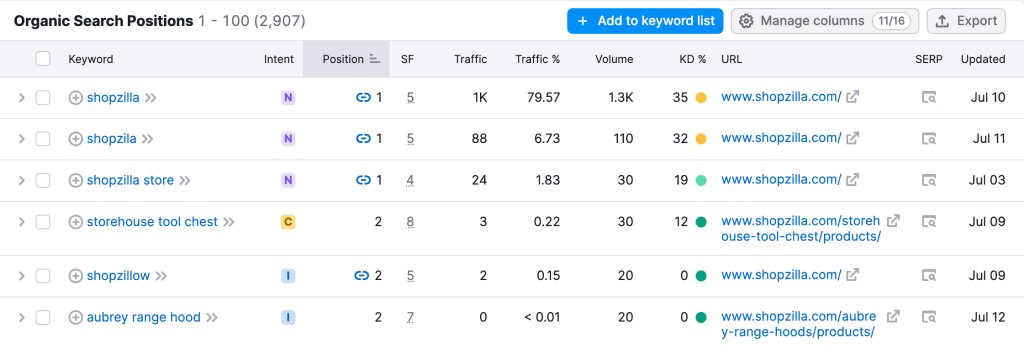
You can also use Google Search Console, which provides insights into the queries that attract users. Analyzing these queries over time reveals if your keywords rank on the first page of search results. Low-ranking keywords indicate the need to optimize content or explore better options.
3. Backlink Profile Strength
The quality and quantity of backlinks pointing to your website significantly impact its authority and rankings. Regularly monitoring your backlink profile allows you to identify opportunities for building high-quality links, detect and disallow spammy or low-quality links, and stay ahead of the competition in search engine rankings.
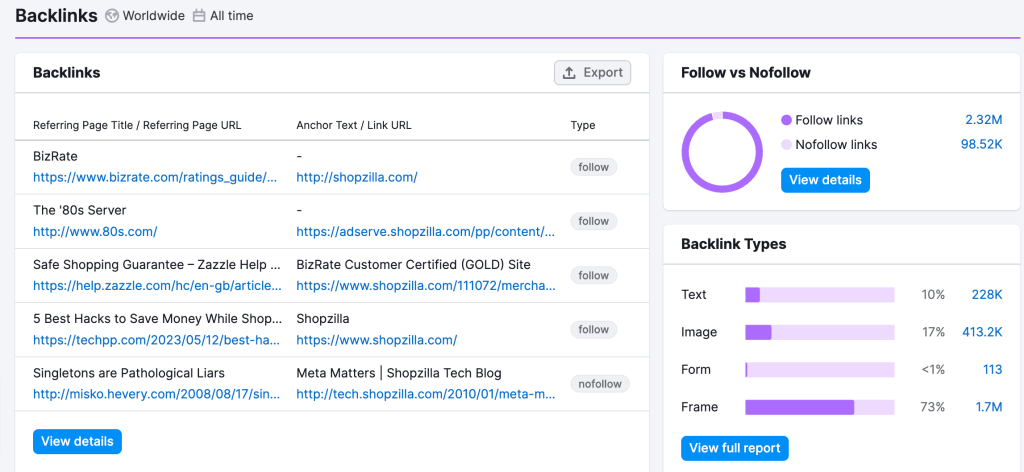
4. Bounce Rate Analysis
The bounce rate is the percentage of visitors who leave your website after viewing only a page. It could be possible because your pages are not meeting their expectation.

A high bounce rate may indicate that visitors aren’t finding what they’re looking for or that your site’s user experience needs refinement. By closely monitoring the bounce rate, you can pinpoint areas for optimization and enhance user engagement across your site.
5. Page Load Speed Optimization
In the era of instant gratification, page load speed is a critical factor for both user experience and SEO. Slow-loading pages can result in higher bounce rates and lower search engine rankings.

Continuously monitoring your website’s page load speed enables you to identify performance bottlenecks, optimize your site for faster loading times, and deliver an exceptional user experience.
6. Conversion Rate Evaluation
Measuring the conversion rate helps you determine the percentage of visitors who complete desired actions, such as making purchases or filling out forms. By closely monitoring this metric, you can assess the effectiveness of your SEO strategies in driving desired user actions and identify areas for improvement to enhance conversion rates.
7. Pages per Session Analysis
The average number of pages viewed per session provides valuable insights into user engagement and content navigation on your website. A higher page per session value generally indicates a higher level of interest and interaction with your content. Regularly monitoring this metric helps you evaluate the effectiveness of your internal linking structure and content layout.
8. Time on Page Assessment
Measuring the average time visitors spend on specific pages provides insights into the level of engagement and the value of your content. By closely monitoring time on the page, you can identify pages that may require improvements. It includes terms of providing value, enhancing readability, or increasing interactivity to maximize user engagement.
9. Competitor Analysis
Apart from monitoring your website’s SEO metrics, tracking your competitors provides you with various indicators that help you improve your SEO efforts.

By analyzing your competitor’s website, you can see what keywords they are targeting, what content they are creating, and what backlinks they are building. This data can help you identify gaps in your strategy and create content that will target these areas.
10. Mobile-Friendly User Experience
As mobile devices dominate internet usage, ensuring your website is optimized for mobile devices is paramount. Monitoring your site’s mobile-friendliness helps you identify any issues that affect the user experience on mobile devices, such as responsive design, mobile load times, or touch-friendly navigation. Optimizing for mobile enhances user satisfaction and supports your overall SEO efforts.
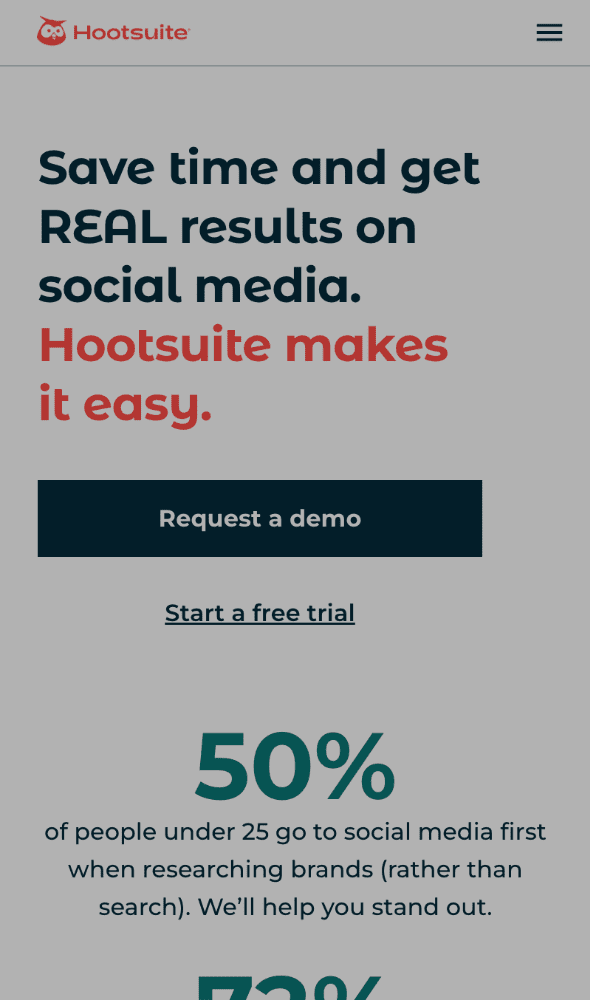
Best Tools for SEO Monitoring
Here are some of the best tools to effectively monitor your SEO campaign and site’s performance:
1. Google Analytics
Google Analytics helps track your website’s traffic and user behavior. Being a free tool, It provides valuable insights into your website’s performance, including the number of visitors, page views, bounce rate, and more.
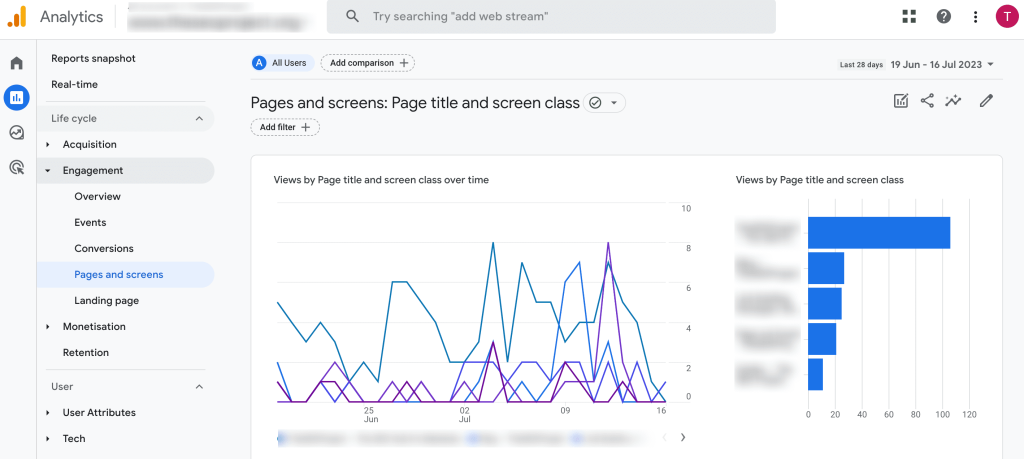
You can use Google Analytics to track your website’s performance over time, identify SEO trends, and optimize your site accordingly. For example, if you notice that a particular page has a high bounce rate, you can make changes to that page to improve user engagement.
2. Semrush
Semrush is a popular SEO tool that provides comprehensive insights into your website’s performance. It offers features like keyword research, backlink analysis, site audit, and more. It also provides competitor analysis, which can help you identify areas to improve your SEO strategy.
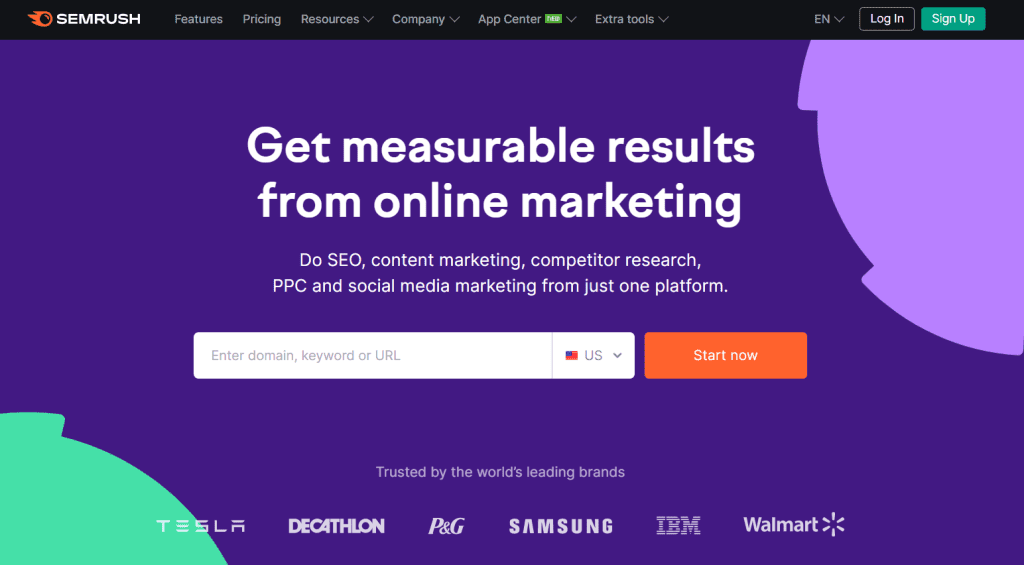
You can use Semrush to identify the keywords that your competitors are targeting and optimize your content accordingly. You can also use it to track the performance of your social media campaigns and advertising efforts.
BONUS: If you want to know more about Semrush, read our honest and detailed Semrush Review.
3. Ahrefs
Ahrefs is another popular SEO tool that provides detailed insights into your website’s backlink profile, organic search traffic, and more. It also offers features like keyword research, content analysis, and competitor analysis.
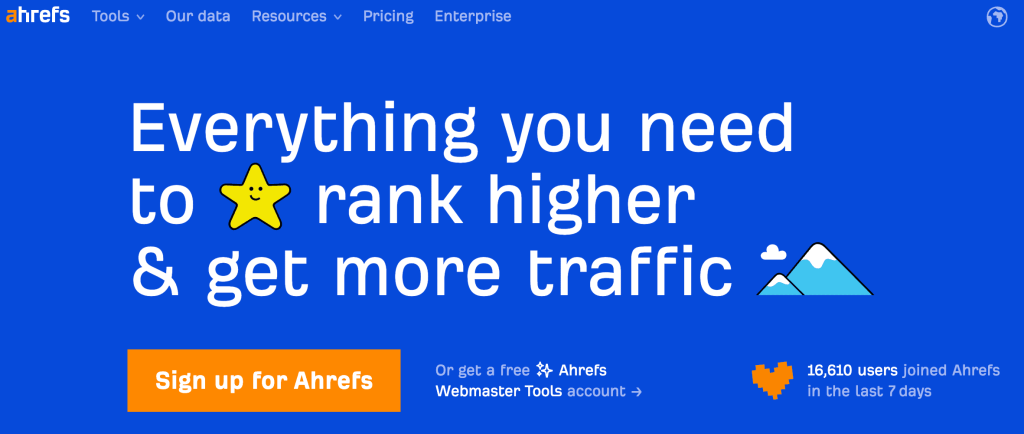
You can use Ahrefs to identify the websites that are linking to your competitors and reach out to those sites to request backlinks to your site. You can also use it to track your site’s performance in search engine rankings over time.
Tip: Click here to know my experience with Semrush and Ahrefs.
4. Moz Pro
Moz Pro is a powerful SEO tool offering features like site audits, keyword research, rank tracking, and more. It also offers a link-building tool to help you identify opportunities to build high-quality backlinks.
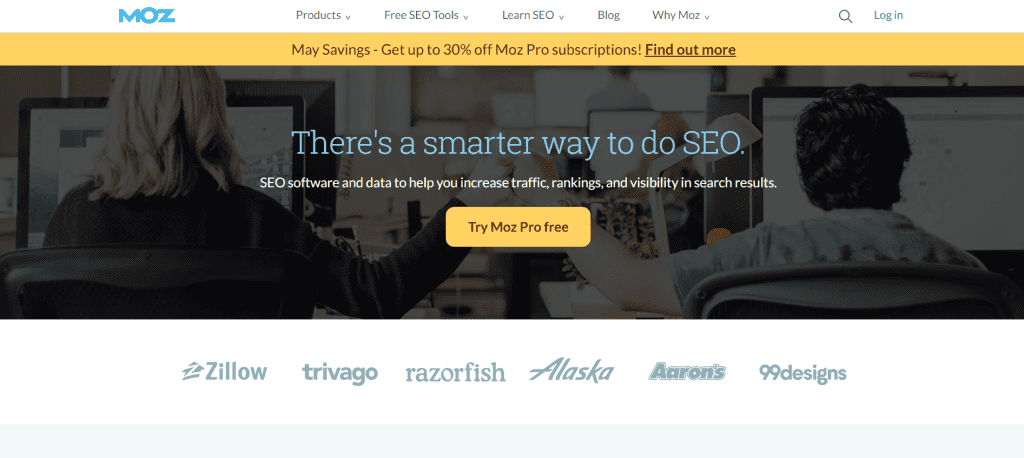
You can use Moz Pro to identify technical issues that may be affecting your site’s performance, such as broken links or slow page load times. You can also use it to improve your site’s local SEO by optimizing your Google My Business listing and monitoring your online reviews.
Also Read: The Ultimate Showdown: Ahrefs or Moz
5. Serpstat
Serpstat being an all-in-one SEO tool offers you features like keyword research, backlink analysis, site audit, and more. It also provides competitor analysis to identify areas to improve your SEO strategy.
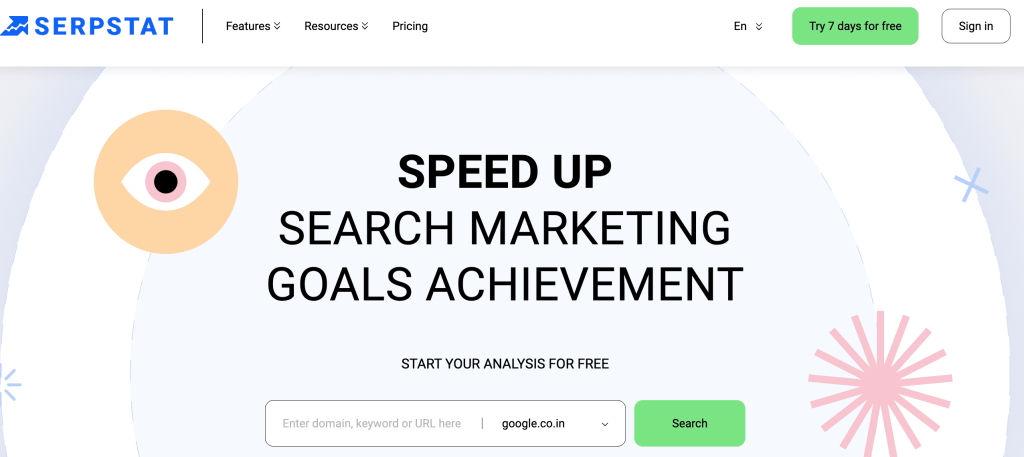
You can use Serpstat to identify the keywords that are driving traffic to your site and optimize your content accordingly. You can also use it to track your site’s performance in search engine rankings over time and monitor your competitors’ SEO strategies.
Related Reads:
Concluding Notes On SEO Monitoring
As I already discussed, SEO monitoring is essential for enhancing your website’s performance and achieving your online goals. By tracking key metrics, analyzing data, and making informed decisions, you can improve your search engine rankings, increase organic traffic, and stay ahead of the competition. And also, remember to choose the right SEO monitoring tools and implement an effective monitoring strategy to drive long-term success for your website.
I have personally used Semrush and it has helped me throughout with the requirement.
Do let me know your thoughts on this.
What tool do you plan to choose?
FAQs: SEO Monitoring
Regular monitoring is recommended at least every month. However, the frequency may vary depending on your website’s size, industry, and competition.
SEO is a long-term process, and results may take time to materialize. However, monitoring allows you to identify and address issues promptly, accelerating the optimization process.
Yes, there are several free tools available, such as Google Analytics and Google Search Console, which provide valuable insights into your website’s SEO performance.
Keyword research is crucial for effective SEO monitoring. Consider relevance, search volume, competition, and user intent when selecting keywords to monitor.
Yes, many digital marketing agencies offer SEO monitoring services. Ensure you choose a reputable agency with expertise in SEO monitoring and reporting.
